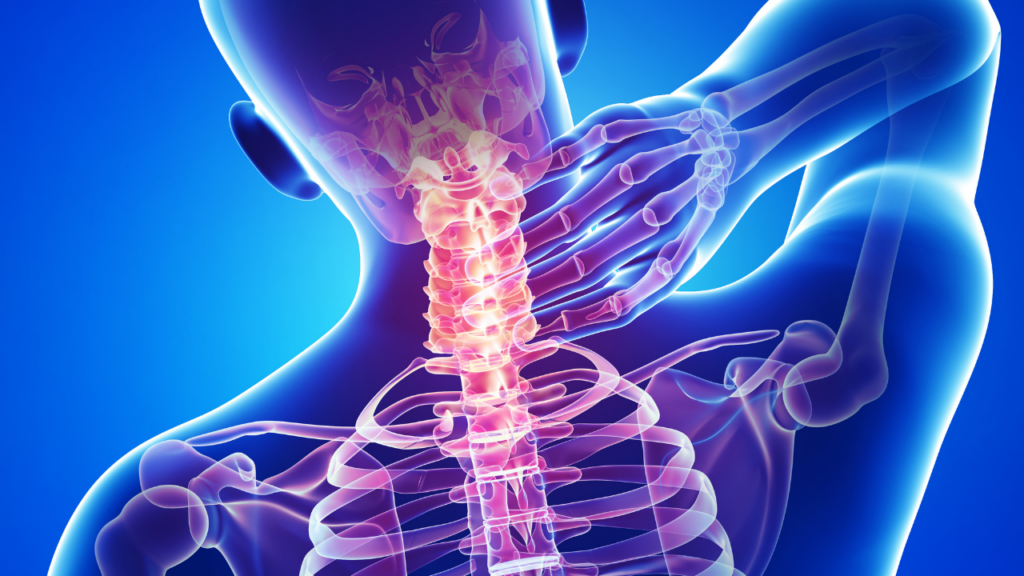Table of Contents
When you get a crick in your neck, your neck feels rigid and less movable than normal. Occasionally, individuals feel as if something in their neck has to snap into place in case of a crick. So, how to get rid of a crick in your neck?
A crick in the neck may be either momentary or long-term in nature. It is often painless, although it is possible that it is associated with persistent neck or shoulder discomfort. What causes a crick in the neck and what treatment options are available are discussed in this article.

Symptoms
Cricks in the neck are common among patients who suffer from neck discomfort. This is owing to the fact that a crick in the neck is often caused by small muscular injuries. However, not everyone who has neck stiffness or a crick also experiences discomfort.
The following are some of the most prevalent feelings linked with a crick in the neck:
- A feeling of tightness in the neck
- The sense of a popping sound or sensation when a person bends their neck
- Sensation that one’s neck should be popped
- Feeling of stiffness in muscles around the neck, such as the shoulders or upper chest
- It is difficult to move the neck in a certain direction
- A sensation that turning the neck would be very unpleasant.
Causes
Before figuring out how to get rid of a crick in your neck, it is important to know the causes. The following are some of the most common reasons for a crick in the neck:
- Muscle damage or strain as a result of sleeping or sitting in an uncomfortable posture
- Spending the whole day in front of a computer
- A slouched position
- Minor injuries such as strains, sprains, and other minor ailments
- Muscular rigidity and inflexibility
- Muscular sluggishness
- Spasms of the muscles
- Whiplash
Sedentary living, prolonged computer use, and insufficient exercise may all contribute to the worsening of small injuries. It also aids in the prevention of the healing of minor injuries such as a crick in the neck.
Neck stiffness and discomfort are caused by an underlying medical condition in around 15% of all instances. These are some of the reasons:
- A herniated disc, which occurs when one of the discs in the spine bulges or expands
- Upper spine fracture, which occurs as a result of an accident or a fall
- Spinal stenosis, which is a narrowing of the spinal cord caused by osteoarthritis
- Osteoarthritis, which is kind of arthritis that affects the joints.
- Spondylolisthesis, a condition in which a bone in the spine shifts and impinges on another bone
A crick in the neck may be caused by a life-threatening neurological or blood vascular problem in rare circumstances. It is critical to determine the cause to find out how to get rid of a crick in your neck.
Some of these issues result in additional symptoms and necessitate the need for immediate medical attention.

Meningitis
Meningitis is an illness that affects the meninges, which are the membranes that surround and protect the brain and spine. Symptoms, which often manifest themselves unexpectedly, include:
- A rapid spike in body temperature
- Confusion
- Alterations in one’s state of awareness
- A severe case of headache
- Pain or numbness in the limbs is a medical condition.
- Vomiting
- Sensitivities to bright light
- Rash
Stroke or heart attack
In certain cases, stiffness in the neck may be accompanied by additional symptoms. These include numbness in the extremities, which may indicate that the patient is suffering from a heart attack or stroke.
Heart attacks and strokes are known to induce acute neck stiffness, which may be life-threatening if not treated as soon as possible after the occurrence. People should seek immediate medical assistance if they have neck stiffness while any of the following:
- Having trouble breathing
- Discomfort in the chest
- Shooting sensations down one arm
- Tingling and numbness in the limbs
- A severe headache that appears out of nowhere
- Confusion
- Jaw ache that is unbearable
- A feeling of weakness or dizziness
Cervical artery dissection
This condition, which occurs when the arteries in the neck are ruptured, sometimes as a result of the neck being overextended, is very unusual and requires immediate medical attention. If you determine how to get rid of a crick in your neck, things will improve.
In addition to neck stiffness, those who suffer from cervical artery dissection may have a strong ache near the base of the skull. A sudden, strong headache is another symptom that many individuals encounter.
Injury to the brain or spinal cord
A fall or a hit to the head or back may cause damage to the brain, spinal cord, or both. These injuries are medical emergencies that may result in lifelong brain damage or paralysis. Get medical attention right away:
- If you have neck stiffness, after a fall or a hit to the head
- Paralysis
- Perception changes or difficulties conceiving a thought
- Seizures
Home Remedies
The underlying reason for a crick in the neck determines the appropriate treatment. If the pain is caused by muscular stiffness or mild injuries, home therapy is often sufficient to alleviate the symptoms.
Use heat and ice
Heat and ice may assist to decrease inflammation and promote blood flow to the neck. It can aid in the healing of the injury more quickly.
A person should attempt alternating between heat and cold packs every 20 minutes for 20 minutes. If one therapy proves to be more effective than another, stick with the one that is effective.
Exercise and stretching
Stretching and physical therapy may be beneficial in how to get rid of a crick in your neck. However, it is always best to seek medical advice first.
Exercise and stretching are very helpful because they combat the most frequent causes of neck stiffness. These include muscular weakness, poor posture, limited flexibility, and muscle spasms. Exercise and stretching may help you get rid of neck stiffness in a few weeks.
According to a 2015 research, a 4-week neck and shoulder stretching practice might help office employees. They suffer from persistent muscular discomfort and stress. A study conducted in 2016 indicated that exercise was a successful therapy for whiplash injuries.
A person may use the following methods to alleviate a crick in the neck:
- Yoga or pilates
- A gentle movement of the head to either side, then up and down into the chest
- Shrugging and rolling the shoulders back and forth, as well as up and down
A person should never force a stretch or overextend the neck since doing so might aggravate the pain even worse. It might also be beneficial to take breaks every hour if your job needs you to sit at a desk.
A quick stroll during your lunch break may be beneficial in combating generalized stiffness. It may also help with how to get rid of a crick in your neck.
Medication
Anti-inflammatory drugs such as ibuprofen, which are available over-the-counter, may help relieve neck stiffness. Swelling and stiffness caused by inflammatory disorders such as arthritis may both be alleviated by medications that target inflammation.
Changing posture
People who suffer from a crick in their neck on a regular basis may benefit by altering their sleeping or sitting positions. A firm pillow, an ergonomic chair, or a neck cushion for lengthy trips or drives might help avoid future stiffness.
Massage gently
A little massage may go a long way toward relieving stress. Give the region a little massage with your hands, or take the help of relatives or friends. In case the region is more severely injured than you know, avoid doing anything that may aggravate the situation more.

Massage may be beneficial for a tight muscle or tendon that has to be worked out. This, in conjunction with some of the other solutions discussed above, may be effective in terms of getting rid of or dealing with the discomfort.
Unconventional Treatments
Acupuncture and chiropractic may be effective treatments for those who suffer from persistent neck stiffness or discomfort. If at-home therapy fails, consult with a doctor before attempting an alternate treatment.
Your doctor might give an effective idea about how to get rid of a crick in your neck.
Medical Care
The best therapy for a crick in the neck depends on whether it is caused by an underlying ailment such as osteoarthritis. Physical therapy, medication, exercise, steroid injections, and surgery are just a few of the therapies that a doctor could offer.
Depending on the severity of the infection, antibiotics and a hospital stay may be required. In the same way, someone who has a heart attack, a stroke, or a ruptured artery will need hospitalization.
They will very certainly need a range of subsequent therapies. It may involve medication, removal of a blood clot, surgery, or the use of blood thinners.
Time for rest and recuperation
It usually takes several hours to several days for most individuals to heal from a crick in the neck. In case the stiffness is caused by an injury or is linked with muscular discomfort, the recovery time may extend.
Cricks in the neck are often related to one’s way of life, and they may recur. To avoid muscular stiffness and injuries in the future, it is necessary to make certain modifications to one’s daily routine.
Although most individuals know how to get rid of a crick in your neck, they can’t manage a crick in the neck at home. Hence, they should contact a doctor.
In the case of more serious diseases, the recovery period will vary based on the underlying issue and other circumstances. For example, osteoarthritis is treatable, although it may need long-term therapy over a period of many years.
Frequently Asked Questions
What is the fastest way to get rid of a crick in your neck?
- Take over-the-counter pain relievers
- Apply ice for the first 48 to 72 hours to relieve initial swelling and pain
- Apply heat
- Try stretching
- Massage the area
- Modify your bedding
- Try a soft neck collar
How long does a crick in your neck last?
When you have a stiff neck, the discomfort and limited range of motion might make it difficult to carry out your daily duties. Symptoms may last anywhere from a few days to many weeks.
They may often accompany a headache, shoulder discomfort, and/or pain that extends down your arm.
Can you rub a crick out of your neck?
Applying heat to the area where your tight muscles are located might aid in their relaxation. Once your muscles are free to move, the nerves in your spine will be able to relax. Hence, your range of motion should return to normal.
One method of applying heat to ease a crick in your neck is to place a heating pad on the affected region for 8 to 10 minutes at a time.
How should I sleep with a crick in my neck?
If you’re experiencing neck stiffness, sleeping on your back or side is the most comfortable posture for you. Sleeping on your back or side is less taxing on your spine than lying on your stomach.
Because your favorite sleeping position is frequently chosen early in life, it may be difficult to modify your sleeping posture.
What helps a stiff neck in 60 seconds?
- Locate the aching location on your body
- Using your fingers, apply strong pressure to the knot to loosen it
- Tilt your head slightly in the direction opposite the cramp. Bend it diagonally as if you were attempting to connect your armpit with your chin
- Repetition of steps 1, 2, and 3 about 20 times in a row
Take Away
A stiff neck is one of the most unpleasant things you experience when you first wake up in the morning. It’s happened to everyone at some point: you slept poorly, you exercised excessively, or you strained something without realizing it.
Neck discomfort, no matter what the source, maybe quite debilitating. For the vast majority of individuals, however, it is not associated with any significant medical conditions. However, how to get rid of a crick in your neck is super critical.
It should be possible to eliminate a crick in the neck by stretching it out and being patient. If home cures do not relieve the symptoms, a person should see a doctor about other treatment alternatives.










